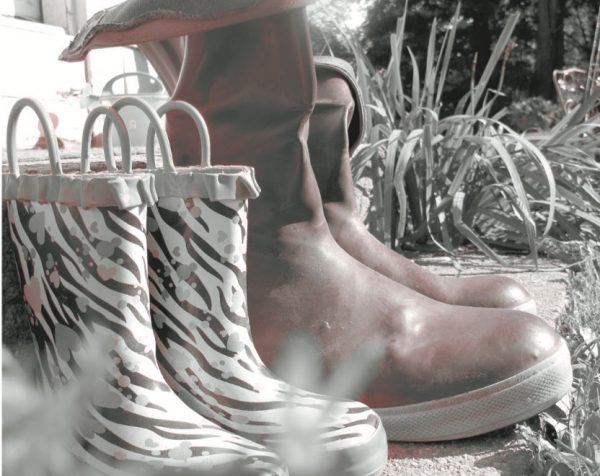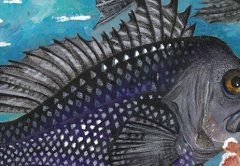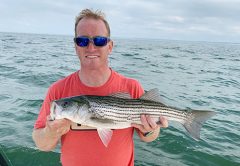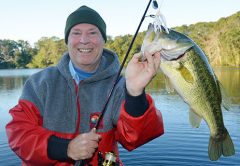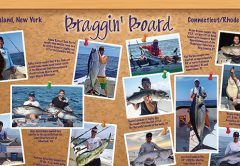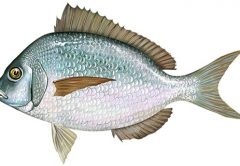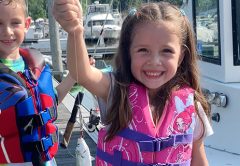Fluking Excursions
Between exhaustively-planned shore fluking excursions with my six-year-old daughter, Kaya, my own somewhat less planned but more focused missions in pursuit of same, and the usual summer line-up of hair-brained impromptu jaunts to the striped bass or near-offshore tuna grounds, I’ve spent a large number of hours fishing with folks in the steeper parts of the piscatorial learning curve.
For all the available technology and the unprecedented flow of technical information and current fishing intel, I can’t shake the feeling that 2016 is decidedly not an easy time to master rodand-reel fishing. Hell, if I had to figure out all the issues of time, tide, and technique I cobbled together over the last 20 years fishing the schedule I do now, I’m confident I could get it done—in about 127 years.
As I attempt to pass on what I’ve learned to folks of various stripes trying to find their own footing in the fishery, I’m seeing with new clarity some basic truths about my own relatively
intensive education. First, I was blessed with good timing: My first professional forays into fluke fishing unfolded when the minimum size for recreational keepers was 15 ½ inches. My tuna training coincided with seasons in the mid- to late 1990s that gave us 50- and 100-fish trips of yellows and albacore within 100 miles of port.
Striped bass abundance hit its biological apex in the early 2000s—exactly the point when I started to unravel the finer points of fooling that target species. It’s not that there aren’t numbers of good fish around in all those categories nowadays. The trick is that, in terms of fishing technique, you really only have the chance to fine-tune approach when fish are biting. It’s hard to rule out methods or gear when you’re deploying baits or chumming or plugging in dead water.
The other trick is that when your fishing experience is consecutive— when you can hit a body of cooperative fish for enough days in arow—you not only get to hone skills through repetition, but get to see patterns in fish feeding or movement you simply cannot piece together in single outings.
The alarming thing in my own catch stats the last month or so is how much of my own technical knowledge I’m using just to keep the skunk away. Kaya and I are catching, but mainly because we’re fishing perfect tides/conditions in places I’ve learned over two decades using graduate-level tactics. We’ve watched a lot of other people get shut out going through the motions that used to get me limits of fluke on my lunch breaks.
On the flip side of the coin, there are a surprising number of folks out trying—folks who obviously have the will to keep going, keep chipping away at the long odds, even in the face of repeated skunking. Maybe the bigger point is that many anglers are learning to find measures of fishing success beyond the simple math of pounds-meat-per-hour.
I have seen more kids and more women fishing my local waters than I can ever remember seeing in the early years of my rod-and-reel career. Amid other discouraging trends in fishing success, I am relieved to see what looks like a future for the sport.
One thing I keep coming back to. As I’ve ransacked my own fishing experience in search of wisdom I might pass on, I keep coming back to my teachers—the wildly diverse cast of characters who collectively taught me the sum of what I know. At the risk of graybearding for a moment, I can’t shake the feeling that there are some very serious and problematic generational differences between the guys who oversaw my training and the guys, my generation and younger, who now hold responsibility for passing traditions into our fishing future.
Consider the number of Millennials who seem to harbor the idea that they can learn anything worth knowing from YouTube—that there’s no need to waste precious free time hanging around all the ancients at the marina who keep insisting there’s no substitute for time on the water. I can agree that one can learn the procedural piece of almost any nuts-and-bolts rigging issue from a glass screen.
The catch is that a given rig is only as useful as your knowledge of its time and place—the latter only learned with real, live water in your foreground.
I think of all the backlash about “spot-burning” and the postmoratorium striper sharpie’s obsession with secrecy. The guy who spends most of his fishing hours scowling about “googans” and “greenhorns” and the white-bucket-toting masses and all their crimes against angling coolness tends not to be out patrolling his local waters in search of prospective pupils and teachable moments.
The guy who will write about any fishing method ad nauseam but wouldn’t be caught dead discussing the parts of the strategic puzzle (i.e. where and when) that makes that technical knowledge useful is spending more energy walling off his hard-won knowledge than trying to pass it along.
Meanwhile, if all the expense of gear, bait, boat, or safe passage to the grounds weren’t enough to keep the fishing population under control, we now face saltwater fishing licenses—another barrier to participation in an era of absurdly high minimum sizes and long odds of catching anything resembling a legal “return on investment” via a fish dinner for the family.
The fishery that sucked me in was built at least in part on the idea a man with the work ethic and the ingenuity could learn to feed himself. While I’ve long railed against the meatmongers of the rod-and-reel world, I have some trouble finding meaning in hook fishing purely for the thrill of injuring, battling, and subduing an unsuspecting game fish.
The bottom line here is that with every passing season, we who’ve amassed some real knowledge through years of good fishing and a load of time-honored wisdom entrusted to us by the generations that cast before us will shoulder more responsibility to do what we can to keep this thing going.
[easy-social-share]

